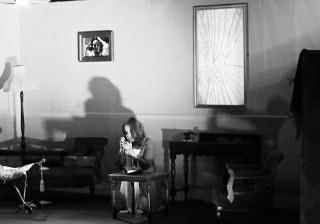It is my pleasure to introduce the following review, written by musicologist, academic lecturer, journal editor-in-chief, Dr Susanna Pasticci, who attended the premiere of the production as a member of the audience during the conference Music and Visual Cultures, in July 2016.
Lights and darkness in the solitude of the number “one”
La Voi x humaine (text by Jean Cocteau, music by Francis Poulenc) stages the solitude of the number “one”: it is a one-act play, set in one bedroom, sung by a single character. This character, one woman, has only one means to break the barriers of her loneliness – a telephone – however that doesn’t work well. In the attempt to communicate with the man who has abandoned her, the connection fails over and over again. She is in despair, wanders all over the stage, but in the end she remains locked in a prison of solitude and pain.
x humaine (text by Jean Cocteau, music by Francis Poulenc) stages the solitude of the number “one”: it is a one-act play, set in one bedroom, sung by a single character. This character, one woman, has only one means to break the barriers of her loneliness – a telephone – however that doesn’t work well. In the attempt to communicate with the man who has abandoned her, the connection fails over and over again. She is in despair, wanders all over the stage, but in the end she remains locked in a prison of solitude and pain.
The challenge to play this role requires a good deal of courage. A powerful and expressive voice is needed, perfectly in tune and rich of timbral nuances, in addition to an expressivity of gesture and a good deal of acting skills. Anyway, the most important feature is the ability to master a wide variety of expressive registers. Even if La voix humaine is a drama, the performer shouldn’t overload the dramatic register. The woman’s inner life is a universe full of contradictions, where the pain and the shadows coexist with fleeting flashes of light. The danger of decaying into a caricature of the tragic, or a parodic excess, is always around the corner; and this is the reason why the great singers of the twentieth century have mainly approached this role during their artistic maturity.
While I was going to see Francesca Placanica’s performance at Maynooth University in July 2016, I was wondering: how should a young performer carry on her slight shoulders the frightful weight of this loneliness? I expected to see a good performance from the technical standpoint, but strictly focused on the dramatic register – namely the easiest, the most direct and immediate.
My predictions were totally wrong. Francesca is able to play a range of different moods which is truly amazing for a young performer. A deep sensibility always allows her to calibrate the gesture and to have always a perfect control of the voice: even in the most dramatic passages, her singing follows the natural inflections of speech and highlights the meaning of the pauses and silences.
La Voix humane is truly resolved only if the performer is not overwhelmed by the heaviness of the pain and its gloomy darkness, but is able to accept the contradictory brightness of the pain. And this is exactly what Francesca does: her performance is full of light and darkness, and is able to suggest many different meaning and expectations.
How can a young performer be so deep, and at the same time so light, bright and expressive? Probably, Francesca’s secret is the choice to combine artistic research with scientific research, and the capacity to develop herself using many different disciplines that are essential to the artistic process.
In this search path, Francesca mirrors herself in the history of music and performance, and in the experience of the singers who have faced this drama before her. Not to find models for imitation, but to find herself, her personal key of interpretation. That is really worth seeing. Not to be missed.


Comments